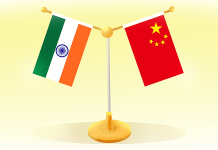West Bengal Chief Minister Mamata Banerjee faced an unexpected challenge during her maiden speech at Oxford University, as student protesters interrupted her address with “Go Back” slogans and allegations of undemocratic governance. The incident, which took place at Kellogg College, Oxford, has ignited a debate on the role of protests in academic institutions and the impact of political discourse beyond national borders.
In This Article:
The event, intended to showcase Banerjee’s governance model, turned controversial as a section of the audience heckled the leader, citing political violence in West Bengal. While the Chief Minister maintained her composure, the disruption became a major talking point, drawing reactions from both her supporters and critics.
What Happened at Oxford?
Banerjee was invited to deliver a lecture on governance, social justice, and economic development at Oxford University. However, a group of student protesters, reportedly members of the Students’ Federation of India (SFI-UK) and other activist bodies, disrupted her speech.
Key Highlights of the Incident:
- Protesters Raised Slogans: Some students shouted slogans like “Go Back Mamata”, challenging her stance on democracy.
- Accusations of Political Violence: Protesters referenced post-poll violence in West Bengal, questioning Banerjee’s record on law and order.
- Mamata’s Response: Banerjee held up a photograph from 1990, showing herself with a bandaged head, recalling an alleged attack by a CPI(M) youth leader. She stated, “Didi walks like a Royal Bengal Tiger,” emphasizing her resilience.
- Intervention by Organizers: Oxford officials attempted to restore order, allowing Banerjee to complete her address despite continued interruptions.
Mamata Banerjee’s Address: Key Takeaways
Despite the disturbances, Banerjee spoke extensively about her governance model, claiming it does not allow discrimination and is centered on inclusive development. She highlighted the achievements of her government, focusing on:
- Women’s Empowerment: She cited Kanyashree and Rupashree schemes as key welfare programs benefiting women.
- Economic Growth: She claimed that Bengal has seen rapid economic progress, positioning itself as a major investment destination.
- Secularism & Social Justice: She reaffirmed that her governance prioritizes harmony and equal rights for all communities.
The Protesters’ Perspective
The students who interrupted Banerjee’s speech argued that she should not be given a global platform when there are serious human rights concerns under her leadership.
- Allegations of Political Violence: Protesters claimed that post-poll violence in Bengal led to severe repression of opposition voices, particularly against BJP and Left party members.
- Autocracy Accusations: Some students called Banerjee an “anti-democratic leader,” criticizing her handling of dissent.
- Freedom of Expression Debate: They argued that just as Indian political leaders protest against undemocratic actions worldwide, global students have the right to challenge Indian leaders on an international stage.
Political Reactions in India
The incident triggered strong responses from Indian political parties and commentators.
- Trinamool Congress (TMC) accused the protesters of being “politically motivated” and trying to defame Banerjee internationally.
- BJP leaders called the protests a “reflection of the reality in Bengal,” stating that students overseas recognize the political oppression in the state.
- Left-wing leaders supported the protesters, arguing that Banerjee has suppressed democratic voices within Bengal and is now facing similar resistance abroad.
Implications of the Incident
The disruption of Mamata Banerjee’s Oxford address raises multiple questions:
- Freedom of Speech vs. Protest Rights: Should political leaders be allowed to speak without disruptions, or do protests serve as an important tool for accountability?
- Global Scrutiny on Indian Politics: The incident highlights how Indian domestic issues are now debated on international platforms.
- Impact on Mamata Banerjee’s Image: The event could affect her global standing, influencing future political and economic engagements for West Bengal.
Moving Forward
Mamata Banerjee’s Oxford speech was intended to be a showcase of her governance achievements but instead became a battleground for political dissent. While she remained firm and composed, the protests have fueled discussions on her leadership and the state of democracy in Bengal.
The event also highlights the increasingly global nature of political discourse, where leaders can be challenged anywhere in the world. Whether this incident will impact Banerjee’s political standing remains to be seen, but it has certainly placed her governance under the international spotlight.
By – Nikita




